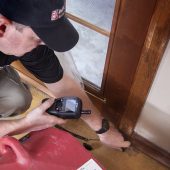So what is the minimum required distance between the gas meter and an electric socket?
The magic number is 3 feet or 1m.
This clearance doesn’t just apply to electrical sockets. It’s essential that you maintain the same distance between the gas meter and any electrical equipment that can spark or arc.
This includes any kinds of electrical switches as well as electrical panels. These are potential sources of ignition.
Notably, an electric meter and normal electric wiring are not considered ignition sources. But gas companies will still maintain a certain distance between them and the gas meter.
Gas and Electricity Safety
Gas is, obviously, highly combustible. So anything that can ignite the gas should be a safe distance away.
This includes obvious sources like a grill or an open flame. It also includes electrical equipment that may produce sparks or arcing, whether as part of their normal operation or because of a fault.
This equipment should be at least three feet or one meter from the gas meter.
It is for the same reason that some gas companies will refuse to situate a gas meter indoors. It’s harder to maintain a proper safe distance from electric outlets and switches.
Some companies also cite ease of access to the meter (for taking readings) as the reason they cannot install a gas meter indoors.
Note that there isn’t a specific regulation about putting gas meters indoors and some gas companies will happily do it usually in the garage as long as there’s sufficient distance between the meter and electrical equipment.
How to Do a Safe Distance Check Yourself
If you are not sure your gas meter is a safe distance from a switch, an outlet or an electrical panel, the safest way to check is using a laser distance meter. Here is how to calibrate one.
It’s more accurate and allows you to take measurements in awkward and hard-to-reach areas such as if the panel is high on the wall.
In some cases, you may need to measure distance from the gas meter to an electrical outlet through the air instead of along the wall. A laser distance meter will be easier to use and more accurate than a tape measure.
But if you are measuring along an easily-accessible part of the wall or floor, a tape measure is good enough.
Note: If you discover that the gas meter is too close to an electrical outlet, your gas company can move it for you for free or at a cost depending on how far it needs to be moved.
What About Gas Piping?
The distance requirements for gas piping are different from those of gas meters.
According to BS 6891:2005, gas piping should be at least 150mm away from electrical switches, outlets, panels and consumer units.
This is closer than gas meters, likely because there’s a smaller risk of leaking from gas pipes compared to gas meters.
Additional Requirements
There are many additional requirements for the location of gas meters and related equipment. For instance, the gas meter should be a minimum of 500mm away from the ground rod.
If you are putting in a new gas connection, your gas company will ensure that the meter and piping are at a safe location.
If you already have a gas connection but are concerned that it may be too close to safety hazards, always consult your gas company or a qualified electrician before taking any action.



Hi Jack,
Thank you for your interesting article.
I have an issue right now and would value your advice. We were contacted out of the blue (via our managing agents) by ‘ES pipelines’ to inform us that they had identified some ‘noncompliances’ with the gas set up in accordance with changing regulations and separately with the building (we need improved ventilation and new fire door). They would be responsible for correcting their noncompliance’s (a number of valves needed to be installed (pipeline, in-line and thermal cut off valves) and for us to improve the environment of the meters.
We have a property with 5 flats and the meters are in a small basement. There’s an electricity supply panel near the gas meters but this appears to compliant by the figures you’ve given. They didn’t mention that as a concern initially about the electricity/gas but only later as a reason to move them further away but still in the basement.
We agreed to do all necessary works to the environment when we met on site. They said the meters had to be moved over to the left on the wall as too close to electrics.
Further, they said we’d need a ridiculously large aperture to ventilate the small room (which doesn’t make sense) and they would try to source cupboard to house all the meters. Thus only a smaller aperture required to ventilate that and give us a quote for this cupboard and assisting in the ventilation to the cupboard.
They called us on the phone 2 months later to say that we’d need to build a cupboard ourselves and the works would cost us 10K plus VAT and be due to us for their services nonetheless.
This didn’t include any improvement in ventilation.
Further, we’d need to get a plumber to reconnect to the 5 gas meters from the new location /purge them to each flat and an electrician to do earth binding for each meter on the same day after they finished their work at about 4pm.
My understanding is that they have a statutory obligation for maintaining a safe supply and keeping it up to date and their original letter made it clear that their works would be at their costs.
You’re figures suggest that the meters don’t need to be moved at all.
We are wondering wether in fact there’s no room to install these new valves and they are conflating insides to try to push their liability and costs to us. Indeed, they suggest it’s all at our cost.
We are happy to fully comply with all our liability optimise the environment in the basement but need your advice and professional expert opinion to the verify what that have been saying to us. We are also confused to learn that it’s apparently CADENT that are our gas network operators and not ES pipelines. We recall that our gas meter at home was moved from the back of our garage near our fuse box to the front. Our local operator conducted all the work and reconnection us at their cost.
We are worried that something odd is occurring and would value your professional advice and opinion. Perhaps a site visit to assess?
Kind Regards,
Abdel and Lara